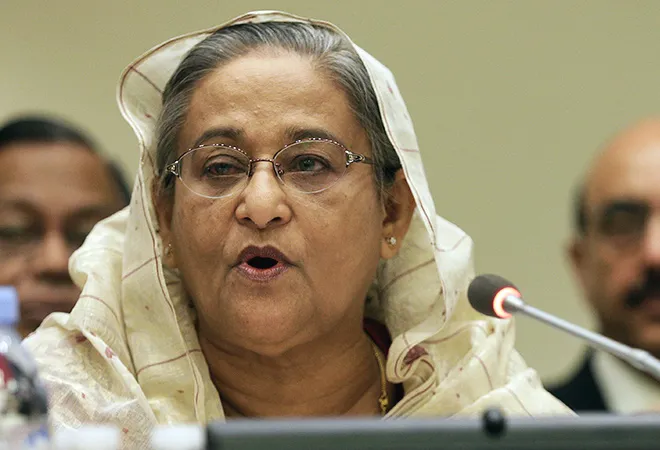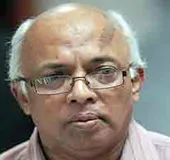-
CENTRES
Progammes & Centres
Location
For Prime Minister Sheikh Hasina, some seriously onerous tasks are out there which require swift and sophisticated handling.

Image Source: Andrew Gombert-Pool/Getty Images
Now that Sheikh Hasina and her Awami League have won an unprecedented consecutive third term in office — and that is minus the five years the Bangladesh leader governed between 1996 and 2001 — a whole lot of responsibility devolves on the government where a shaping of priorities and a setting of strategy about handling them is concerned. To be sure, the sheer magnitude of the electoral triumph the ruling party obtained at the general elections on Sunday has left large chunks of the population dazed. For the political opposition, in the form of the Jatiyo Oikya Front or national unity front led by former foreign minister Kamal Hossain, the elections have been a farce. The front, encompassing the largest opposition party, the Bangladesh Nationalist Party of jailed former prime minister Khaleda Zia, apart from a clutch of other rightwing parties opposed to the Awami League, took little time in rejecting the results of the election on the evening of the day the election (30 December) was held and demanding new elections conducted by a neutral, obviously caretaker administration.
The BNP, stung by the manner of its defeat, has sought to inform anyone who will listen that the results of the voting are proof of elections not being fair and free when held under a political government, which the Awami League administration clearly is.
It is unlikely that the demand will be met, for within Bangladesh the mood today is one of people acknowledging the primacy of the Awami League in the national politics for reasons of a varied nature. What the latest election has done is to deepen the roots of the party in the area of governance for the next five years. The BNP, stung by the manner of its defeat, has sought to inform anyone who will listen that the results of the voting are proof of elections not being fair and free when held under a political government, which the Awami League administration clearly is. But the difficulty for the BNP and its allies in the front is two-fold. In the first place, Sheikh Hasina and her party have projected the results of the election as a fresh and decisive mandate for the next five years. In the second, having scrapped the constitutional provision relating to a caretaker government operating between the end of the term of an elected government and the beginning of another, the prime minister and her colleagues will be in little mood to entertain the demand. In the years since the repeal of the caretaker administration provision in the constitution, the government has consistently argued that Bangladesh must pursue internationally accepted standards relating to elections, which is that elections will be held with a political government in charge.
It is, of course, reasonable to argue that Bangladesh’s politics is yet to reach a stage where political governments can ensure a smooth transition of power following an election. But that, as many argue, is no reason for the country to go back to an interim or caretaker government system. That said, there are some critical issues which have arisen in light of the general elections. One of those issues, of course, has to do with the composition of the new parliament which will take charge at the end of this month. With the Awami League and its allies filling almost every seat in the new parliament and with the BNP and its partners in the unity front reduced to a pitiful seven seats, the absence of a proper opposition makes for a huge gap in the promotion of parliamentary democracy in the country. The Jatiyo Party of former military ruler Hussein Muhammad Ershad has of course decided to play the role of the opposition in parliament with its 22 seats. The BNP and the Gano Forum of Kamal Hossain have meanwhile refused to have their seven elected lawmakers take the oath of office. In such circumstances, the Election Commission will have little choice other than calling by-elections, a step that might throw the seats into the lap of an already mammoth ruling party in parliament, opening the doors to new issues.
With the Awami League and its allies filling almost every seat in the new parliament and with the BNP and its partners in the unity front reduced to a pitiful seven seats, the absence of a proper opposition makes for a huge gap in the promotion of parliamentary democracy in the country.
For Prime Minister Sheikh Hasina, therefore, some seriously onerous tasks are out there which require swift and sophisticated handling. Having romped to a fresh term on the record of the economic progress made by her government, a reality acknowledged by a usually critical West, the prime minister will need to move into all those areas where her government has been getting flak over the years and for good reason. Corruption is one area where the government will need to go for merciless action; there is a huge requirement for the government to ensure the growth of institutions, among which are the judiciary, civil service, police, Election Commission and Anti-Corruption Commission. For years the government has been charged with violations of human rights even as it has made impressive strides in the economy and in the overall social structure. Over the next five years, therefore, the government will need to roll back the criticism it has earned over human rights violations and what has been perceived as its unwillingness to tolerate dissent, especially when such dissent is voiced in the media. In bare terms, while life continues to reach higher standards in terms of a guarantee of healthy economic performance, the focus for Sheikh Hasina and her administration will be on a gradual but relentless development of liberal politics in the country. She will need to reach out to the opposition no matter how minuscule it has been rendered by Sunday’s elections and thereby add new meat to the bone of political pluralism in Bangladesh.
As the strongest and longest-serving head of government in Bangladesh, Sheikh Hasina has already stamped her presence in history. In the next five years, she will be called upon to build a democratic system of substance that will have her leave a legacy for future generations of Bengalis. One way of ensuring the building of that legacy will be for her government to carefully steer clear of any demonstration of an arrogance of power.
The views expressed above belong to the author(s). ORF research and analyses now available on Telegram! Click here to access our curated content — blogs, longforms and interviews.

Syed Badrul Ahsan is a Senior Journalist and Commentator on South Asian affairs based in Dhaka. Ahsans entry into full time journalism came about through ...
Read More +